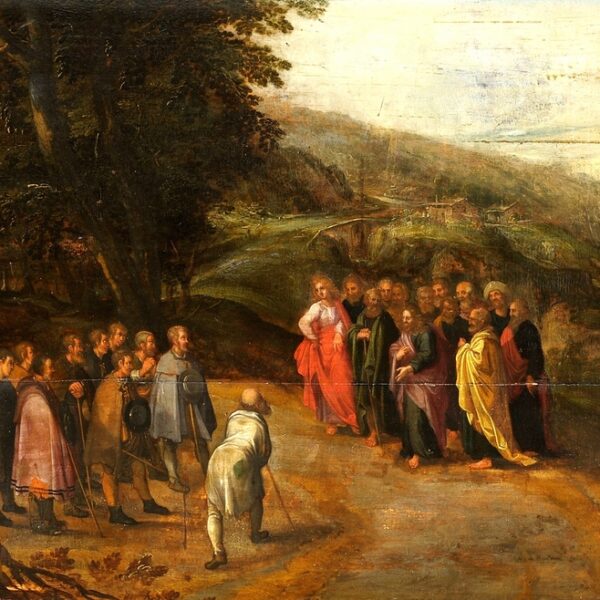The wise and foolish virgins – a picture of two kinds of believers

Science and Earth’s Origins
May 30, 2014
“Preaching not in persuasive words, but in demonstration of power and of the Holy Spirit”
June 13, 2014“Then the kingdom of heaven will be comparable to ten virgins, who took their lamps and went out to meet the bridegroom. Five of them were foolish, and five were prudent. For when the foolish took their lamps, they took no oil with them, but the prudent took oil in flasks along with their lamps. Now while the bridegroom was delaying, they all got drowsy and began to sleep. But at midnight there was a shout, ‘Behold, the bridegroom! Come out to meet him.’ Then all those virgins rose and trimmed their lamps. The foolish said to the prudent, ‘Give us some of your oil, for our lamps are going out.’ But the prudent answered, ‘No, there will not be enough for us and you too; go instead to the dealers and buy some for yourselves.’ And while they were going away to make the purchase, the bridegroom came, and those who were ready went in with him to the wedding feast; and the door was shut. Later the other virgins also came, saying, ‘Lord, lord, open up for us.’ But he answered, ‘Truly I say to you, I do not know you.’ Be on the alert then, for you do not know the day nor the hour” (Matthew 25:1-13, NASB).
Symbolism of the lamp and of the oil
A lamp in scripture is often a metaphor for God’s word and its illuminating effect when we follow His instructions. “Your word is a lamp to my feet and a light to my path” (Ps. 119:105, NASB). Proverbs 6:23 says, “For the commandment is a lamp and the teaching is light” (NASB). A lamp is also used to describe the spirit of man, as Proverbs 20:27 states: “The spirit of man is the lamp of the Lord, searching all the innermost parts of his being” (NASB).
So we can see in this parable that all the virgins (symbolic of the church, which throughout scripture is referred to as a bride preparing for her wedding) are equipped with lamps, and all ten of them are going out to meet the bridegroom (Matt. 25:1). Both the wise and the foolish therefore are Christians.
Oil is symbolic of the Holy Spirit (see Lev. 2:1-2, Lev. 8:12, Ps. 133:2, Isaiah 61:3, Luke 4:18, Acts 10:38, et al). Therefore, the key element that distinguishes the five wise from the five foolish is having “enough of” the Holy Spirit.
In the tabernacle in the wilderness, God’s instructions were that His people should bring “clear oil of beaten olives for the light, to make a lamp burn continually” (Ex. 27:20, NASB). Likewise, a picture of oil supplying lamps is found in Zechariah 4:1-3 and Revelation 11:4, which correspond to the Last Days and the two witnesses who prophecy and perform miracles in the power of the Holy Spirit.
Darkness and a delayed bridegroom
Notice in verse 5 of the parable it says that “the bridegroom was delaying.” The virgins were expecting Him, but He wasn’t appearing as soon as they were anticipating. The consequence of this was that both the foolish and the wise got drowsy and fell asleep. Like Jesus’ disciples in Gethsemane, they weren’t on the alert as He’d asked them to be. But at midnight, “like a thief in the night” (see 1 Thess. 5:2, 2 Peter 3:10, Rev. 16:15) there was a shout – an announcement of the imminence of the Bridegroom. Further symbolism is the wedding as a reference to the Marriage Feast of the Lamb (Rev. 19:6-9).
I have been meditating on this parable for the last ten months. I do not pretend to imagine that I have all the answers to its layers of meanings. What stands out to me is that this is a description of the time leading up to Christ’s return (v. 13), and that these are people with access to the lamp of God – His precepts and requirements. Without the continual overflow of and reliance upon the Holy Spirit, there will be believers – even those who have known the scriptures well – who find themselves with the terrifying prospect of a door slammed in their faces, and the equally horrifying words, “I do not know you” spoken to them by Christ. These are the same words Jesus says He will assign to the evildoers (see Matthew 7:21-23).
I’ve been thinking also of churches that give careful attention to the scriptures and which nurture an understanding of the word – or certain parts of it – but neglect the teaching and inviting in of The Holy Spirit. I have been pondering how without the Holy Spirit, we can’t even properly understand the depths of the Bible, even though we might know entire books of it by heart. I’ve been watching the pressures of our culture squeezing professing Christians into calling “what is evil is good and substituting darkness for light” (Is. 5:20). I have been thinking of my own need to tune into the Spirit and draw closer – to abandon any thoughts of doing whatever is outside of His will for me.
My prayer for myself and for the church as a whole is that we will draw near to God, that we might have the spiritual sight and fortitude to persevere through the darkness and not miss the Bridegroom’s return.






2 Comments
Dear Emily,
Thanks for your honesty and openness. I too have been studying this passage with great intensity. It is amazing how there are so many different interpretations. Regardless of the numerous viewpoints, the Word of God remains true. One cannot get beyond the fact that there was a shut door. There are several theological discussions around this passage. Some believe the virgins “professed” Christ, others define them as unbelievers, while yet another group see them as believers. Nonetheless, the truth remains the same. God desires a relationship with all that is “real and personal.” And yet another truth, everyone will not accept Jesus as their Savior. And finally, God is calling the Church to wake up and live a life that glorifies Him. The religious spirit must cease, playing church must cease and dumbing down the gospel much cease. It is incumbent upon the ministers of the gospel to preach truth regardless of the itching ears.
Thank you for your thoughts, Barbara. Yes, when I was a child I always thought the foolish virgins were unbelievers; however, now as I read and meditate on this parable, I see that it is clearly two types of believers described. It seems to symbolize the falling away, or Great Apostasy, that scripture also forewarns. I appreciate your insights. Particularly what you wrote at the end in your last couple sentences…I wholeheartedly agree.